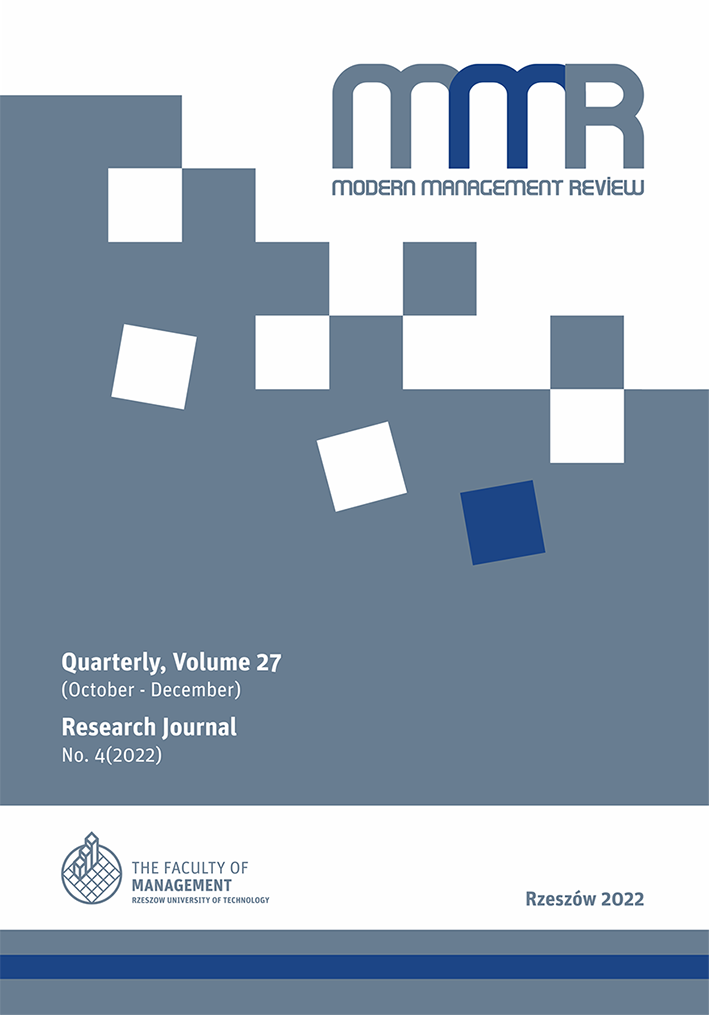Abstrakt
One of the elements of creating a competitive advantage of modern enterprises is the development of supply chains, in which logistic processes are essential. Managing such a supply chain allows the integration of key business processes from the end user through suppliers delivering products, services and information, which provides added value for customers and other stakeholders.
The main purpose of the study is to assess the degree of implementation of logistic business processes within the supply chain in enterprises operating in the agri-food industry. The source material on the basis of which the analysis was carried out and conclusions were formulated were surveys conducted among agribusiness entrepreneurs from Podkarpacie.
The conducted research shows that the level of advancement of logistics processes in supply chains depends on the type of industry in which a specific company operates and its size. Larger economic entities, due to the possibilities and capital they have, use advanced and integrated IT systems supporting production planning, supply, distribution and sales. The implementation of such tools allows for the standardization of many business processes within the network of connections of entities participating in a common supply chain.
Bibliografia
Baran, J., Wysokiński, M., Jałowiecki, P. (2011). Rozwiązania w zakresie sterowania zapasami w wybranych branżach agrobiznesu. „Logistyka”, nr 2.
Christopher, M. (2000). Logistyka i zarządzanie łańcuchem dostaw. Warszawa: Wydawnictwo Polskie Centrum Doradztwa Logistycznego.
Ciesielski, M. (2011). Zarządzanie łańcuchami dostaw. Warszawa: Wydawnictwo PWE.
Dinu, M.D. (2016). Supply chain performance within agri food sector. Wydawnictwo Economics of Agriculture 3, UDC: 658.82:641.033.
Gu, F., Yu, X. (2022). Profit distribution mechanism of agricultural supply chain based on fair entropy. PLoS One 17(7).
Glavee-Geo, R., Engelseth, P., Buvik, A. (2022). Power Imbalance and the Dark Side of the Captive Agri-food Supplier–Buyer Relationship. „Journal of Business Ethics”, 178(3).
Kiełbasa, M. (2015). Przyszłość sektora rolno-spożywczego w Polsce w odniesieniu do stanu obecnego. „Progress in Economic Sciences”, 2.
Klepacki, B., Wicki, L., red. (2014). Systemy logistyczne w funkcjonowaniu przedsiębiorstw przetwórstwa rolno-spożywczego. Warszawa: Wydawnictwo SGGW.
Lambert, D.M., Pholen, T.L. (2001). Supply Chain Metrics. “The International Journal of Logistics Management”, Vol. 12, No. 1.
Lambert, D.M. (2008). Supply Chain Management: Processes, Partnership, Performance. SCM Institute, Sarasota FL.
Lee, H. (1998). Preface to global supply chain and technology management. in: Lee (Eds.): Global supply chain and technology management. Floryda: POMS series in technology and operations management. Vol. 1, Production and Operations Management Society, Miami.
Michalczyk, J. (2018). Zrównoważone łańcuchy dostaw żywności. Wybrane inicjatywy. „Prace Naukowe Uniwersytetu Ekonomicznego We Wrocławiu”, nr 523.
Piocha, S., Dyczkowska, J. (2012). Zarządzanie łańcuchem dostaw. „Logistyka”, nr 5.
Polak, P., Tokarski, M. (1996). Znaczenie rozwoju systemu informacyjnego dla integracji łańcucha logistycznego. „Gospodarka Materiałowa i Logistyka”, nr 7–8.
Szczepanowski, A. (2020). Zmiany w sektorze rolno-żywnościowym w Polsce i polskich regionach po akcesji do Unii Europejskiej [w:] Przygodzka, R., Gruszewska, E., red., Instytucjonalne i strukturalne aspekty rozwoju rolnictwa i obszarów wiejskich. Księga poświęcona pamięci dra hab. Adama Sadowskiego Profesora Uniwersytetu w Białymstoku. Białystok: Uniwersytet w Białymstoku. https://doi.org/10.15290/isarrow.2020.12.
Świadek, A. (2013). Koniunktura gospodarcza a aktywność innowacyjna przedsiębiorstw przemysłu spożywczego w Polsce. Problemy Rolnictwa Światowego. „Zeszyty Naukowe SGGW”, 13(28), z. 1.
Tundys, B. (2015). Krótki łańcuch dostaw produktów spożywczych (SFSC) – ujęcie teoretyczne i praktyczne, „Zeszyty Naukowe Uniwersytetu Ekonomicznego w Katowicach”, nr 249.
Urban, R. (1998). Przemysł rolno-spożywczy [w:] Woś, A., red., Encyklopedia Agrobiznesu. Warszawa: Fundacja Innowacja.
Wicaksono, T., Bálint Illés, C. (2022). From resilience to satisfaction: Defining supply chain solutions for agri-food SMEs through quality approach. PLoS ONE. 17(2).
Witkowski, J. (1998). Koordynacja łańcucha dostaw w wielozakładowym przedsiębiorstwie Przemysłowym. „Gospodarka Materiałowa i Logistyka”, nr 9.
Wszystkie teksty zamieszczone w kwartalniku "Modern Management Review", dostępne są w pełnej wersji na stronie internetowej Czasopisma. Od numeru 19 (3/2012) zostały także wprowadzone identyfikatory cyfrowe (DOI: 10.7862/rz.2018.mmr.1)
Artykuły w czasopiśmie Modern Management Review są udostępniane na warunkach licencji Creative Commons (CC-BY 4.0), w tym na następujących polach eksploatacji obejmujących:
- prawo do wydawania Utworu drukiem w formie książkowej i cyfrowej oraz jego rozpowszechniania w formie książkowej i cyfrowej, w tym poprzez wyświetlanie, odtworzenie, nadawanie, publiczne udostępnienie przez Wydawcę oraz podmioty trzecie,
- prawo do utrwalenia i zwielokrotnienia całości lub części Utworu na papierze i w formie zapisu cyfrowego oraz w każdy inny możliwy sposób przez Wydawcę,
- prawo do wprowadzania Utworu do pamięci komputera oraz zapisywania Utworu w systemach informatycznych Wydawcy i innych podmiotów dystrybuujących treści cyfrowe,
- prawo do archiwizowania Utworu oraz tworzenia kopii Utworu na nośnikach elektronicznych przez Wydawcę, bez ograniczeń ilościowych,
- prawo do digitalizacji Utworu oraz dokonywania konwersji/przekształceń Utworu w wersji elektronicznej na inne formaty cyfrowe przez Wydawcę oraz podmioty trzecie,
- prawo do rozpowszechniania Utworu, w tym za pośrednictwem sieci Internet lub innych sieci teleinformatycznych przez Wydawcę oraz inne podmioty trzecie, w sposób umożliwiający oglądanie, czytanie, kopiowanie treści Utworu w postaci elektronicznej, tj. wszystkich elementów do niego należących, przy czym przez kopiowanie rozumie się zapisanie przez osobę zainteresowaną udostępnionego jej Utworu na wybranym przez nią nośniku,
- prawo do przechowywania Utworu w bazie danych Wydawcy i innych podmiotów dystrybuujących Utwór w jakiejkolwiek postaci, jak również jego przetwarzania w bazie danych Wydawcy oraz podmiotów trzecich,
- prawo do tłumaczenia i wydania Utworu w jednym z języków nowożytnych w jakiejkolwiek postaci przez Wydawcę oraz podmioty trzecie.


